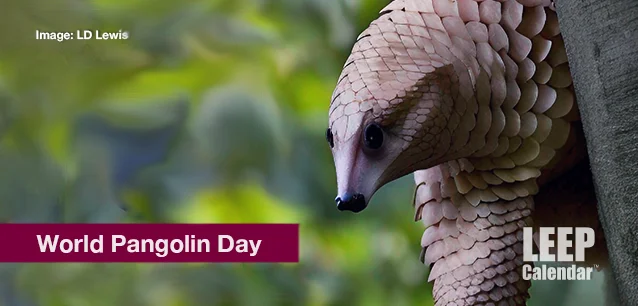 AD
AD
Today is: November 22
Scroll to explore events active on this date.
LEEP INK FEATURES

August is Appropos
A toddler playing in the fountain at a park in Santa Fe, New Mexico—Photo LD Lewis. In August, we live through the Dog Days of Summer. It's hot and often humid, and those ...

September is Sassy
Can you hear that sigh of relief from parents worldwide? Yes! September marks the return of students to school, a global phenomenon. Preparations for the ACT and SATs begin earnestly for ...

OOH LA LA, October
October is the busiest month for events, with 5% more happening than in May, the second most eventful month. Sailing enthusiasts will be glued to the finals of this year's Am...
About World Pangolin Day
Fundraising Event
Ends: Feb 15, 2025
DESCRIPTION:
World Pangolin Day raises awareness about the importance and plight of the pangolins.
One aspect making pangolins unique is their scales, as no other mammal has them. Quiet and diligent, pangolins range from the size of a house cat to a medium-weight dog.
The eight pangolin species live in Asia and Africa and are becoming endangered due to their status as the world's most trafficked animal. These gentle and shy mammals are highly sought after in Asia for their scales and tender meat, which is expensive and considered a status symbol when eaten.
Like many rare animal parts, though nothing more than keratin (the material comprising fingernails), their scales are sought for several thoroughly debunked "natural" medicines; essentially, they're killed for superstition as fingernail clippings provide the same ingredient. Not a single medical application using pangolin parts, ranging from alieving arthritis to menstrual cramps, has been scientifically proven effective.
Pangolin scales are sought as good luck charms for wealth attraction and to protect from evil spirits—a use also scientifically debunked.
What about the ever-present quest for male virility for which many animals, from tigers to gorillas, are sacrificed on the altar of the masculine potency myth? Men in some Asian cultures believe eating a stewed pangolin fetus enhances their sexual efficacy and vigor. It doesn't. Pangolins reproduce just one offspring a year; each fetus destroys two—the mother whose belly is sliced open and the baby inside.
Pangolins, when threatened, curl up into a ball. Their scales protect them from natural predators, but their position and their passivity make them very easy to handle, abuse, and cage by humans. Though they look like an anteater, they are closely related to wolves and bears. Pangolins support the ecosystem by reducing insect populations, and their preferred food is termites. That alone is a great reason to keep pangolins around.
VIDEOS
ADDITIONAL IMAGES
Currently, this event does not have supporting images.
Where would you like to go now?
 AD
AD



/footer-logo.svg)
